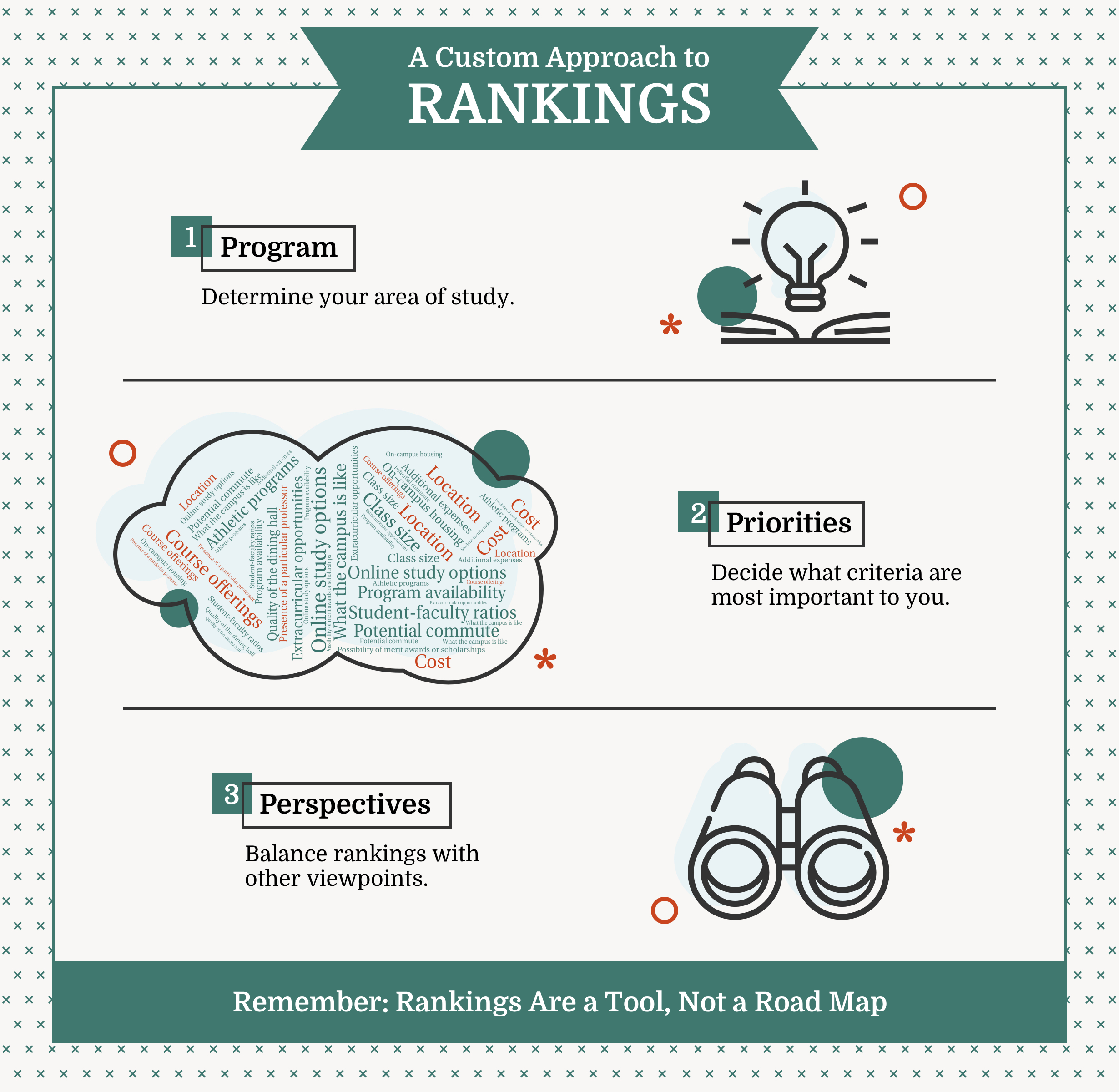thebestschools.org is an advertising-supported site. Featured or trusted partner programs and all school search, finder, or match results are for schools that compensate us. This compensation does not influence our school rankings, resource guides, or other editorially-independent information published on this site.
Are you ready to discover your college program?
TheBestSchools.org provides rankings to help you identify top options, but finding your ideal fit requires customization.
Each student has unique priorities and goals in their college search. While college rankings consider factors such as academic strengths and costs, only can applicants understand their unique needs. The top-ranked program for one student might not be the best fit for another.
Our guide can help you use rankings to find the right fit for your priorities.

Choose Your Program of Study

Once students have determined their course of study, they often find it easier to evaluate rankings and choose between schools. At the undergraduate level, learners typically do not need to pre-declare a major. However, narrowing their interest to broad categories like liberal arts, health sciences, education, or social services can help degree-seekers identify the schools with the strongest programs in those areas. Learn more by checking out our guide on choosing a major.
At the graduate level, applicants often have a clearer idea of their focus areas. By focusing on a particular subject, applicants can narrow their search to the best programs for their professional goals.
Know Your Priorities

Our rankings take multiple factors into consideration, including cost, exclusivity, student-to-faculty ratios, and graduation rates. However, individual students have their own priorities when evaluating programs. Some students prioritize location, while others want programs with robust online options.
Before researching programs, applicants should spend some time considering their priorities. For example, they can create a list of their priorities and rank them, or create a spreadsheet that weighs criteria based on the student's priorities. Factors students should consider, some of which do not typically appear in college rankings, include:
- Location (geographic, as well as urban/suburban/rural)
- Program availability
- Course offerings
- Online study options
- Athletic programs
- Extracurricular opportunities
- Cost
- Class size
- On-campus housing
- Potential commute
- Additional expenses
- Presence of a particular professor
- Student-to-faculty ratios
- Availability of merit awards or scholarships
- What the campus is like
- Dining hall quality
Get Multiple Perspectives

One single ranking often can't provide a holistic look at a school's strengths and weaknesses, which is why students should seek out multiple perspectives when comparing schools. For instance, applicants can review multiple rankings to see how programs stack under different methodologies. Some rankings prioritize programs with low admission rates or high prestige, while others factor in tuition costs or online enrollment options, so each is unique.
In addition to rankings, prospective applicants should seek out more personal perspectives. Reach out to recent graduates or current students to learn more about any potential program. A ranking can tell you how many students graduated from a program, but a current enrollee can provide advice based on first-hand experience.
Finally, a trusted advisor, such as a professor, supervisor, or family member, can help you talk through your options and make the best decision for your unique circumstances.
Rankings as a Tool, Not a Road Map
A top-ranked school will not always produce a better outcome than a second-place school. College rankings are a tool, not a universal roadmap. Consider, for example, a prospective applicant interested in MBA programs to study entrepreneurship. If the top-ranked MBA program does not offer an entrepreneurship concentration, it's not the best option for that candidate.
Rather than using rankings as a yardstick to measure academic success or only applying to programs with a top-place ranking, prospective students should use rankings to find reputable prospective programs and start the research process, helping them find the best fit for their unique needs.
Frequently Asked Questions
What Do College Rankings Mean?
College rankings evaluate an institution's program offerings, admission rates, graduation rates, affordability, and reputation. Different rankings weigh these factors differently, so students can benefit from researching the ranking's methodology and comparing several different rankings.
Which University Is Best for Undergraduate Study?
Many universities rank highly for undergraduate study, including flagship public institutions, elite private schools, and liberal arts institutions. However, the "best" school is the one that provides the learning environment and degree options that best align with your personal educational and career goals.
What College Ranking Is Most Accurate?
College rankings consider many different factors, such as affordability, prestige, and graduation rate. Most rankings rely on reputable data sources, like IPEDS, because rankings are only as accurate as the data behind them.
Header Image Credit: Tomas Rodriguez | Getty Images
Learn more, do more.
More topic-relevant resources to expand your knowledge.
Popular with our students.
Highly informative resources to keep your education journey on track.
Take the next step toward your future with online learning.
Discover schools with the programs and courses you’re interested in, and start learning today.


